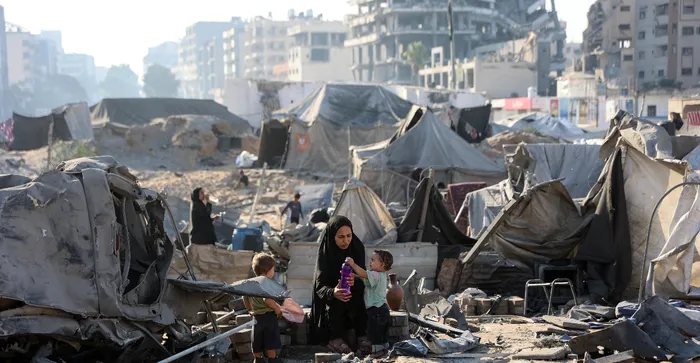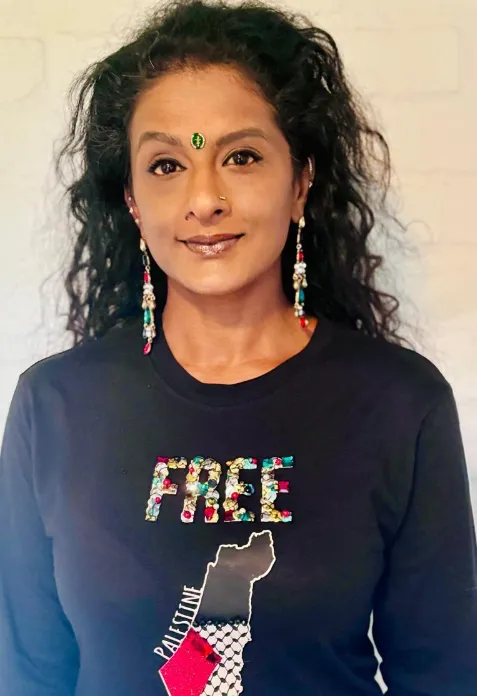
A displaced Palestinian woman sits with children amid devastated tents, following an overnight Israeli strike that levelled a building and damaged the surrounding temporary shelters, in the Rimal neighbourhood of Gaza City on Saturday. Israeli military operations killed 50 people in Gaza on September 12, the territory's civil defence agency said, as the army stepped up its attacks on Gaza City.
Image: Omar AL-QATTAA / AFP
I SIT here, staring at the screen, the glow casting shadows that feel too much like the ones etched into my soul these past months. It’s September 2025, and the world spins on, coffee sipped in cafes, deadlines met in boardrooms, while in Gaza, the earth itself weeps blood.
Satellite images don’t lie; they scream. Entire neighborhoods in Gaza City, once alive with the laughter of children chasing kites now lie as rubble-strewn graves. Homes pulverised, hospitals hollowed out like the hearts of those who survived only to bury their kin. Over 64 000 souls extinguished since October 2023, a number that is in all likelihood much higher, 163 503 more carrying wounds that fester in the silence of indifference.
And the children. God, the children. One hundred and thirty, starved to whispers by a famine Israel has engineered with surgical cruelty. I close my eyes, and I see them: tiny hands clutching empty bowls, eyes hollowed by a hunger that gnaws deeper than bombs. How did we get here? How did a people, resilient as the ancient cedars of Lebanon, become pawns in a theater of endless atrocity?
Netanyahu’s voice echoes like a dirge: no Palestinian state, ever. Evacuation orders rain down on Gaza City, herding a million souls south to a strip of land already choked with the displaced, where “safe zones” dissolve into kill boxes. Famine confirmed, genocide whispered by UN experts who plead for the world to wake. Yet here I am, an ocean away, fingers trembling over keys, wondering if my rage is enough. It’s not. It never has been.
But in this abyss, a flicker: the Global Sumud Flotilla. Oh, that name, Sumud, steadfastness. It stirs something primal in me, an ache that blooms into fire. Launched on August 31 from ports across the Mediterranean, this armada of over 50 vessels, carrying delegations from 44 countries and more than 1 000 activists, including Ada Colau, Liam Cunningham, and Jaldia Abubakra, a Gazan exile sailing home after 40 years, delivers not just aid, rice, medicine, diapers for the babies born into hell, but a defiant pulse of humanity.
Italian ships slice through waves from Syracuse and Catania, their crews chanting for a corridor of mercy. Malaysian vessels under the Sumud Nusantara banner departed even earlier, on August 23, laden with food and supplies. Activists from every corner, Greta Thunberg among them, her voice a bridge from climate grief to this shared catastrophe, sail toward a blockade unbroken since 2010, when Israel turned the Mavi Marmara into a slaughterhouse of dreams.
They are the antidote to my despair, these sailors of solidarity, proving that even in tyranny’s shadow, compassion charts a course. But defiance invites darkness.
In Tunisia’s harbor at Sidi Bou Said, where the flotilla paused to regroup after delays from weather and logistics, drones descended like vengeful spirits. Twice, September 8 on the Family boat, carrying Thunberg and our own Yusuf Omar - a South African journalist - and steering committee members, and September 9 on the Alma, where experts later identified a grenade-like incendiary device and a charred electronic remnant on deck.
Israel denies it, of course, but the scars on the hulls whisper truths louder than denials, as activists like Portuguese parliamentarian Mariana Mortágua point to the obvious culprit with interest in sabotage. Undeterred, repairs underway, and with additional vessels still streaming in from Barcelona’s first leg, the flotilla pressed on engines humming toward a mid-month rendezvous off Gaza’s shores, fragile sails catching the promise of dawn.
Ben-Gvir, that architect of hate, plotted their interception, branding them Hamas enablers. And yet, they vow resilience, departing Tunis with unyielding sumud. UN voices rise in solidarity, demanding protection for these bearers of light. Families of the aboard plead with governments, Spain, Italy, our own, for shields against the storm. Even as their official X account on social media vanished under suspension, perhaps the latest whisper of censorship, their momentum swells, with global banners unfurling in places like Tehran’s Valiasr Square and honest reckonings in unexpected ads exposing the siege’s grip.
What haunts me most is the mirror it holds to us all, the raw, bleeding hypocrisy that last week’s headlines laid bare like an open wound. While feeds exploded with grief and fury over Charlie Kirk’s assassination, the 31-year-old conservative firebrand gunned down mid-sentence at a Utah campus rally, his death, a national tragedy with the suspect swiftly apprehended and justice demanded from the Oval Office itself, I couldn’t help but choke on the silence that engulfs Gaza’s innocents.
Vigils bloom across campuses, graphic videos loop in endless outrage, rightfully so, for no life should end in such senseless spray of bullets. But where was that thunder, that visceral howl, for six-year-old Hind Rajab? Trapped in her family’s car in Gaza’s Tel al-Hawa last January, her tiny voice cracking over a frantic phone call to rescuers: “Please come save us. I’m so scared.”
Israeli tanks didn’t hesitate; they unleashed hell, over 300 bullets, tearing through metal and flesh, riddling the vehicle until Hind, who hid among the dead bodies of her aunt, uncle, and four young cousins was reduced to echoes in the rubble. And the paramedics? The two brave souls dispatched with Israel’s nod of “safe passage”?
Ambushed and incinerated in their ambulance, a war crime etched in fire and UN condemnations that faded like morning mist. I, who could only and still continue to post on social media with the self same fervour and ferocity as Israeli bombs that fall on Gaza, who wept at every tally of the dead, now question: Have I grown numb to this double standard? Has the world’s selective outrage, fierce for a Trump ally felled by an assassin’s bullet, a blaze that scorches headlines for days, yet mute for the thousands of Palestinian children slaughtered in Gaza’s shadow, the hungry and desperate lured with promise of food to aid sites, only to be shot and killed for sport, eroded my fire?
Netanyahu’s cabinet eyes Gaza’s erasure, not reconstruction; aid sites in Rafah mock the north’s agony. Leaders like Macron and Starmer murmur of recognition, two-state illusions, while bombs fall. It’s a farce, this diplomacy of delay, where Palestinian lives are footnotes to electoral calculus, and a single American death drowns out the dirge of thousands.
I think of Tamer, a voice from Gaza’s tents, his words a knife to the gut: “Save us before it’s too late… no space left, even in death.”
Or Muhammad Smiry, filming displacement’s tide: families fleeing south, only to drown in overcrowding’s crush. These are not abstractions; they are my brothers, sisters, the mirrors of our shared fragility. In the West Bank, over 1 000 abducted in Tulkarm’s shadows, children torn from beds. And Qatar? A strike there, assassinations veiled as justice, all to shatter ceasefires before they breathe.
But the flotilla? It rekindles me. It is the poem I cannot write, the prayer I falter in uttering. These boats, buffeted by drones and doubt, embody the truth Audre Lorde etched: “Your silence will not protect you.”
They sail for the malnourished child in Deir al-Balah, for the mother in Khan Younis sifting ruins for her son’s shoe. For every Palestinian voice, clinging to hope in a tent of despair - crying out against the machine. For Hind’s ghost, whose unanswered plea exposes the lie that some blood runs redder than others. We must be their wind. Demand your governments escort these vessels, sanction the siege, amplify the abducted’s echoes from Tulkarm.
Boycott the brands that fund the blockade; flood the streets as students do in Rome, tents pitched against the rain of complicity. Introspect with me: In a world that feasts while Gaza starves, what legacy do we leave if we turn away? The flotilla teaches resilience, not resignation. It whispers: We are not saved by safety, but by standing for Hind, for every child whose name we must etch into our fury until the hypocrisy crumbles.
As the sun dips here, I imagine their sails catching dawn over the Mediterranean, fragile, fierce, unbreakable, now slicing through waves toward Gaza’s besieged horizon. Gaza endures because they do. And so must we. For in their wake, sumud becomes ours.

Vanessa Govender
Image: File
Vanessa Govender is a former SABC radio and award winning ENCA television news reporter. She is an author of the children’s book, The Selfish Shongololo, the best selling memoir, Beaten But Not Broken, and the recently released memoir, The Village Indian. Follow her on X @Govender_VInstagram @vanessa_tedder
** The views expressed do not necessarily reflect the views of IOL or Independent Media.